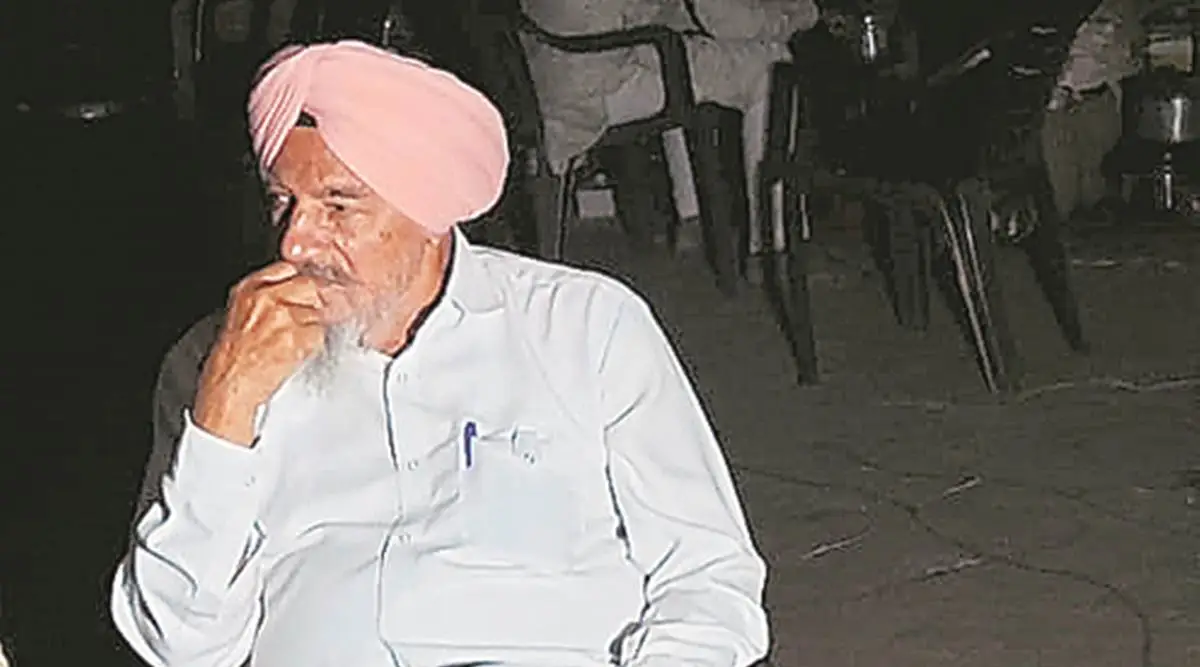 At Bahadurgarh, 7 km from Tikri protest site. (Express)
At Bahadurgarh, 7 km from Tikri protest site. (Express)Alleging that the farmer protests are being hijacked by the hard Left and “Maoist” elements, Union Minister Piyush Goyal, addressing the FICCI AGM Saturday, did not name anyone. It was an apparent reference to 75-year-old-year-old Joginder Singh Ugrahan and his Bharatiya Kisan Union (Ekta Ugrahan).
At its transit camp, a gaushala abutting a temple 7 km from the Tikri border, posters of jailed human rights activists arrested in the Bhima Koregaon case lie stacked near the entrance – on December 10, the Human Rights Day, Ugrahan’s colleagues and supporters had held posters of those in jail and demanded their release, drawing sharp reactions from the ruling BJP and other farmer leaders.
Ask him about the allegations and Ugrahan, who formed his outfit in 2002 after breaking away from the BKU (Ekta), remains unchanged and unflinching. He makes no bones that he wears his protest politics on his sleeve — he joined the Shaheen Bagh protests last winter.
“First they called us Khalistani, then they called us Pakistani, now we are called Naxals. The language keeps changing, but there is no let-up in the attacks. And the same people harp on the importance of dialogue,” Ugrahan told The Sunday Express.
He took the surname from his village in Punjab’s Sangrur district and served in the Indian Army before returning to his 5-acre holding.
His colleagues in the BKU (Ekta Ugrahan) appear to be outliers, almost. Especially since December 10. Other protesting groups have become wary of Ugrahan and are cautiously distancing themselves from him.
Yet December 10 was not the first time that the Ugrahan group, which is lending outside support to the Samyukt Kisan Morcha leading the protests, took up the cause of these activists.
Ekta Ugrahan launched protests in 2018, soon after the arrest of activist Gautam Navlakha in the Bhima Koregaon case. Later, it worked on mass mobilisation programmes against the Citizenship (Amendment) Act, with Ugrahan himself attending the Shaheen Bagh sit-in.
Asked about his ideological leanings, Ugrahan said it would be wrong to call him a Communist. “We follow Bhagat Singh as well as Baba Nanak,” he said. Union insiders say more than its decision to demand the release of the rights activists, which also found mention in a memorandum submitted to the Centre by over a dozen farm unions on October 14, its position that a joint forum should not necessarily operate as a single organisation is behind its outlier status.
“Ugrahan believes just because unions representing various groups and ideologies come together under the same umbrella for a common cause, they don’t need to shelve their individual projects and programmes,” a functionary of the union said.
Ugrahan, who took up the farmer cause by joining a movement in 1982, points out that the union was not in favour of the call for indefinite rail roko, keeping in mind the interest of the people of Punjab. “Instead, we suggested the gherao of corporate establishments and BJP leaders, which the joint forum finally adopted,” he said.
The union led a dharna outside the residences of Punjab Chief Minister Amarinder Singh and the Badal family from September 15 to 22, against the suggestion of other unions to restrict it to one day, Ugrahan said, conceding that he has had differences with other unions from the very beginning.
“Differences are bound to be there. The challenge is to draft an action plan and work towards a common goal. But many of our proposals have been rejected so far,” he said.
The discomfiture of the other unions with Ugrahan did not come out in the open until the December 10 event. Many unions of the Samyukt Kisan Morcha distanced themselves from the event, while some took a more lenient view.
Darshan Pal Singh, president, Krantikari Kisan Union (Punjab), told a press conference on December 10, “I think the programme at Tikri was showing cases of human rights violation. We are not politicising the matter. The programme was simply highlighting problems of the present and previous governments.”
Rashtriya Kisan Mazdoor Mahasangh president Shiv Kumar Kakka said the event had “nothing to do with the ongoing protests”.
Harpal Sangha of Azad Kisan Committee (Doaba) said, “There are differences over many issues. But views of the majority always prevail. But it seems the government wants to create a rift among us. We cannot afford to make even one mistake.”
Hannan Mollah, CPM leader and general secretary of the All India Kisan Sabha, said: “Ugrahan is just one group which observed Human Rights Day. We told them not to mix these things here, so that the government does not get a chance to target us. Now they say the Left is hijacking the movement. The fact is only seven to eight organisations are Left-oriented… This is another falsehood to try and shift the narrative. The kisan identity is a secular identity. This is a new contribution of farmers to Indian democracy.”
Ugrahan, meanwhile, maintains it is important to stand up for the rights of the jailed activists “as they have raised their voice and joined hands in fighting against forcible land acquisition, for upholding the dignity of indigenous communities”.
“This is and will remain a peaceful movement,” he said.
He has been the undisputed president of the union for the last 18 years. It has over one lakh members across 10 districts of Punjab, mostly in the Malwa region.
The organisation has a large number of women activists. Ugrahan’s wife too was an active member of the union before she passed away in 2014.
In the past, the union has been at the forefront of several protests, including against the Trident Group’s land acquisition in Barnala, a proposed power plant in Mansa, decision on power board privatisation, rape of a woman in Faridkot, attack on landless Dalit labourers in Sangrur.